Stage Left Theater opens season with ‘Cyrano’

On paper, it would seem as if Cyrano de Bergerac has it all.
An expert swordsman, he also has a way with words and impresses many with his poetry. He is also a charismatic, quick-witted and noble man.
But as Cyrano sees it, all of that means nothing thanks to one not-so-little problem: his large nose.
Cyrano believes that, despite his many talents and worthy traits, his nose has made him unlovable.
Stage Left Theater will explore how the way people see Cyrano differs from the way he sees himself in their production of “Cyrano,” which opens Friday.
“It ties into human nature,” director Chris Wooley said of Cyrano’s insecurities. “If we project ourselves as Cyrano, we have to think about what’s holding us back or what keeps us from achieving our goals. Is it ourself or is there actually something that’s physically keeping us from being able to do that? More often than not, it’s in our head.”
This adaptation of French playwright Edmond Rostand’s “Cyrano de Bergerac” finds the original play’s 30-50 characters reduced to nine actors, but the meat of the story is still there.
Cyrano (Dalin Tipton) is a noble man who is in love with his distant cousin Roxane (Lindsay Teter), herself in love with a cadet named Christian (Blake King-Kreuger).
Roxane asks Cyrano to protect Christian, who will soon join Cyrano’s company of guards, and he agrees. Christian, meanwhile, loves Roxane but considers himself a simple man who could never match her intellect.
Seeing an opportunity to secretly profess his feelings to Roxane, Cyrano offers to write Roxane letters pretending to be Christian.
“Cyrano” also stars Fred Strange (Le Bret), Eliot Drushella (De Guiche), Ron Ford (Ragueneau/Philippe), Bryan Durbin (De Valvert/Etienne), Jordan Holden (Ligniere/Jean-Pierre) and Andrea Tate (Desiree/Marcel/Sister Mathe/Bellrose).
Stage Left’s adaptation of “Cyrano,” two acts instead of the original five, also does away with the original’s total rhyme, instead using rhymes sparingly throughout the play.
“Instead of having everything in total rhymes like you find in a lot of Shakespeare, this one, they went away with the rhyme scheme of it and had more of the guts of the play,” Wooley said. “You get the story with some poetry thrown in versus it all being poetry, which helps with the pace quite a bit.”
Another change brings to the stage the 100-person sword fight Cyrano encounters, which, in the original version, the audience is told about after intermission.
Fight captain Durbin, who Wooley first worked with during a Spokane Civic Theatre production of “Treasure Island,” choreographed the show’s two sword fights.
“The Stage Left is a very small, intimate theater, and one person standing in the middle of the stage with a sword can almost touch both walls with it,” Wooley said. “Getting a sword fight that has eight or nine people on it, it’s a little intense in there so we had to get a little creative with it.”
When learning sword fight choreography, actors practice at staging speed or “ ‘Matrix’-style, super slow motion,” according to Wooley, so they can work on getting good form.
Once there, the actors work in rehearsal speed, which is about half the speed of performance speed.
“We don’t jump into performance speed until usually the day before we have a performance because adrenaline hits and then everybody goes faster,” Wooley said. “If you get going too fast, the audience doesn’t get to enjoy it but then there could be a safety issue.”
Only four years old, Stage Left is considerably younger than other theaters in town. Because of this, the theater has reached out to others in town for help on “Cyrano.”
Eastern Washington University’s theater department lent Stage Left the rapiers used in the sword fights, the Spokane Falls Community College theater department loaned the theater props, and the Civic Theatre loaned Stage Left period-appropriate costumes.
“We’ve got all the theaters coming together, supporting each other, helping create something that’s beyond the reach of any single theater,” Wooley said. “It’s a really, really cool thing seeing everybody coming together and say ‘Hey, let’s make theater better in Spokane.’ ”